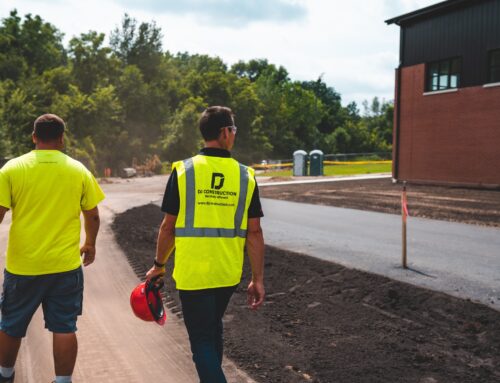We’ve all been there – Nobody wants to make a big purchase without double-checking that they’re getting the best value. That’s perfectly normal, and the same thought process applies to construction projects. Oftentimes, this will lead many prospective clients to wonder, “How much does a building cost?”
As tempting as it may be to voice this question, we’re here to advise you against that.
In most cases, the question is too generic, setting you up for a potentially wildly inaccurate answer. Seriously. Google it and you get answers ranging from $70-$1000 per square foot.

Does that truly answer what you want to know? Not exactly. Asking how much a building costs assumes that construction is a commodity, and contractors are producing building widgets. “Company X’s widgets cost $100, and Company Y’s widgets cost $125. Company X must just be cheaper,” you think.
While that can be true, it’s generally much more complex. Trying to choose a contracting partner based on the question “How much?” leaves you susceptible to disappointment in a number of ways.
If you assume all contracts are producing building widgets, then it would make sense to ask them how much their buildings cost and pick the lowest one. (And full transparency, the lower one can be the right one sometimes.) However, generally what happens is that each of these contractors provides a rough guess based on their own set of assumptions. If you pick one and their assumptions don’t match your wishlist, you could find yourself in a tight spot later on by being short on funds to complete the work, or at least forced to sacrifice key components of what you originally wanted.
The cost of a building is much more nuanced than just a simple dollar amount. How much a building costs is influenced by a multitude of different factors, making it difficult to reduce an answer down to a simple dollar figure. And without a more thorough investigation, if someone can throw out a round number off the cuff, it may not be an accurate answer for your project. How much it costs depends on the building itself, and what is going into the building. Here are just a few factors that can influence the cost:
- Building size
- Given all the same components and parameters, a 100-000 square foot building will cost less per square foot than a 10,000 square foot building. Economy of scale is a real factor in construction.
- Location
- The local municipality you build in can affect cost based on numerous factors that can really add up, such as geography, zoning laws, and physical characteristics. Permits and inspections for the construction can also be affected, as different cities and counties have various requirements and landscaping ordinances.
- Construction Site
- Challenges on the site itself can also play a large factor in cost. Unforeseen circumstances such as hidden utilities at the site, availability of city utilities, soil instability, and drastic amounts of cut or fill needed for grading all can significantly increase the cost.
- Complexity of Design
- A basic square industrial building with a small, simple office and no facade enhancements is going to be far cheaper to construct per square foot than the same size square industrial building, if it includes things like: a complex facade, interior mezzanines, and a larger modernized office area, and so on.
- Finish Level
- Flooring, paint, cabinetry, and appliances are just a few of the finishing touches an owner will need to decide on, with a diverse selection to choose from, spanning a wide price range. High-end finishes such as quartz countertops and decorative lighting fixtures are going to drive up the price when compared to more basic finishes.
- Mechanical Systems
- Integrated systems such as electrical, plumbing, and heating & air conditioning systems can be customized to the owner’s preferences on controllability. So, the fancier the system, the higher the cost.
- Unique Project Features
- Balconies, patios, commercial kitchens, gym equipment, and pools are just a few examples of amenities that can quickly drive up the overall cost of a project, as these components wouldn’t normally be factored into the cost per square foot.
Conclusion:
Simply asking “how much?” ignores these critical variables. The answer you get could be inaccurate, incomplete, or even misleading. There are plenty of questions to consider asking instead, giving you a better understanding of all the components that go into a building’s cost. Here are just some examples of the questions you should be asking:
- How much are you charging to manage my construction project?
- How will you make sure I’m getting the best value for my money?
- How does your process deliver a competitive project cost?
- How do I know what is included in my construction project?
- How does communication work throughout the construction process?
- How do you monitor and inform on the project’s progress?
- What happens after my construction project is complete?
By shifting your focus from a simple price tag to the details and complexities of the project, you’ll engage in a much more informative conversation. At that point, the real question from a contractor to you is, “What type and size of building do you want, and what do you want in it?”



You must be logged in to post a comment.